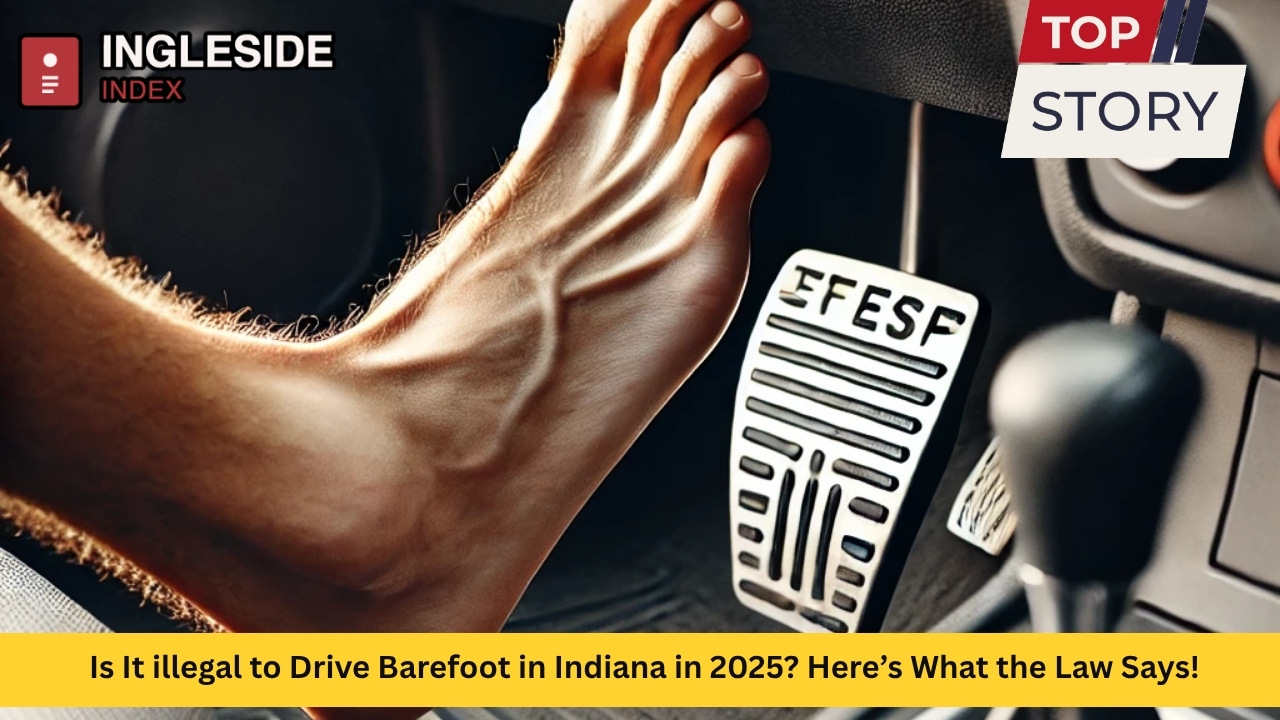Barefoot driving is one of those topics that often sparks debate among drivers in Indiana and across the United States. Some drivers swear by the feeling of freedom and enhanced control when behind the wheel without shoes, while others see it as unnecessary or even risky. But the key question that keeps popping up, especially as laws and public interest evolve: Is it illegal to drive barefoot in Indiana in 2025? Is this practice against state law, or is it merely discouraged by safety experts and law enforcement officers?
This comprehensive guide dives deep into Indiana’s road laws, examines myths and facts, and explores the practical considerations around driving barefoot. It also looks at major cities in the state, provides relevant statistics, and offers professional opinions to help you understand what’s really at stake when you slip off your shoes before hitting the road.
Debunking the Barefoot Driving Myth
One of the biggest driving myths in the United States is that it’s illegal to drive barefoot. For decades, many drivers have heard from friends or even family members that taking your shoes off before starting your car could land you a hefty ticket.
However, across all 50 states, including Indiana, there is no specific law that prohibits driving barefoot. This myth has persisted for generations, perhaps due to concerns about safety or misunderstandings of related regulations. In reality, the Indiana Bureau of Motor Vehicles has repeatedly clarified that barefoot driving is not against the law. This remains true in 2025, despite occasional rumors circulating online or in conversations.
What Indiana Law Actually Says About Barefoot Driving
If there’s no explicit ban on barefoot driving, what does the law say? Indiana’s vehicle code and traffic regulations are available for public review, and there is no mention of footwear requirements for everyday passenger vehicles.
Policymakers in Indiana have not introduced any bills or regulations specifically targeting drivers who wish to operate their vehicles without shoes. State troopers and local police officers across cities like Indianapolis, Fort Wayne, Evansville, South Bend, Carmel, and Bloomington do not issue citations solely for driving barefoot.
However, that does not mean drivers are entirely free from responsibility. Indiana law requires drivers to maintain full control of their vehicles at all times. If an officer determines that driving barefoot contributed to an accident or resulted in unsafe vehicle operation, additional charges like reckless driving or operating a vehicle in an unsafe manner could apply. This is rare but possible, particularly if the absence of shoes is seen as a direct cause of an incident.
City-Level Perspectives: Regional Discussions Across Indiana
Let’s look at how this question plays out in some of Indiana’s major cities.
Indianapolis
In the capital city, home to more than 870,000 residents, local traffic enforcement follows statewide regulations. Indianapolis Metropolitan Police Department confirms that wearing shoes is not required by local city ordinance for private vehicle operation.
Fort Wayne
Second in population, Fort Wayne’s local government addresses road safety but doesn’t regulate footwear. Local police and community programs focus more on impaired and distracted driving campaigns.
Evansville
Further south, Evansville’s Department of Motor Vehicles receives occasional public inquiries about barefoot driving, especially from new drivers attending driving education classes. Their response consistently echoes the official statewide stance: No law against barefoot driving, but safety is advised.
South Bend, Carmel, Bloomington
These cities, with their vibrant college populations and bustling urban environments, have fielded similar queries. Local law enforcement agencies report virtually no cases of accidents attributed directly to barefoot driving, and no efforts to regulate it independently of state law.
Safety Considerations and Professional Opinions
Even though barefoot driving isn’t illegal in Indiana, it’s worth looking into why some might consider it unsafe—or even unwise. Driving safety organizations and emergency responders often urge caution.
Why Safety Experts Advise Against Barefoot Driving
-
Lack of Foot Protection: In emergencies, such as a sudden stop or an accident, bare feet are more vulnerable to injury.
-
Potential Loss of Grip: In wet, sweaty, or otherwise slippery conditions, drivers might have less control over the pedals compared to wearing grippy-soled shoes.
-
Impaired Pedal Control: Some drivers may find it more difficult to modulate the brake and accelerator precisely without shoes.
-
Slippery Pedals: Summer rainstorms or icy winters can lead to wet pedals, increasing the likelihood of the foot slipping.
When Barefoot Might Be Safer
Interestingly, there are instances when barefoot driving could be considered safer than driving in certain footwear. High heels, flip-flops, sandals, and heavy boots can all make pedal control awkward, which can lead to momentary lapses in safe driving.
Safety experts often recommend flat-soled, securely fitting shoes for optimal control. However, they acknowledge that, for some drivers, barefoot operation may offer more sensation and better pedal feel than poor footwear options.
The Impact of Barefoot Driving on Insurance Claims
Car insurance specialists in Indiana emphasize that operating your vehicle barefoot won’t invalidate your insurance policy. However, if you’re involved in an accident and your lack of footwear is seen as the direct cause, your insurer might investigate for negligent operation. This could affect claims and potentially raise premium rates for future coverage.
Ultimately, shoes or no shoes, what matters most is safe operation. Insurance companies look at the entirety of a situation—weather, traffic, distractions, and footwear—when assessing fault and determining claim payouts.
Final Thoughts: Barefoot Driving in Indiana in 2025
As of 2025, Indiana law continues to permit barefoot driving, aligning with most states across the U.S. The state’s primary concern is road safety and responsible operation—not what’s on your feet. While there are no fines or penalties for driving without shoes, the ultimate burden falls on drivers to ensure they operate their vehicles safely at all times.
From Indianapolis’ bustling city streets to the quiet roads of rural Indiana, driving barefoot is a personal choice. But with this freedom comes responsibility: prioritize safety, use common sense, and stay informed about changing regulations.
If you take nothing else from this guide, remember that being aware of your abilities and the conditions around you is always the best step towards safer driving—shoes or not.




